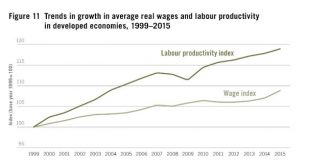I’ve just written a ‘top 10’ overview of the recent Alberta budget. Points raised in the post include the following: -The budget lays out a four-year strategy of spending cuts, letting population growth and inflation do much of the heavy lifting. -After one accounts for both population growth and inflation, annual provincial spending in Alberta by 2022 is projected to be 16.2% lower than it was last year. -Alberta remains Canada’s lowest-taxed province. It also...
Read More »The Great Paradox: Liberalism Destroys the Market Economy —Heiner Flassbeck
Another paradox of liberalism arising from equation of economic liberalism with capitalism and of economic liberalism as equatable with political liberalism as representative democracy. The rise of interest in social democracy now no accident of history but rather a logical progression of the historical dialectic?Flassbeck EconomicsThe Great Paradox: Liberalism Destroys the Market Economy Heiner Flassbeck
Read More »MEDIA RELEASE: Alberta should increase social spending; cuts are not the way to go
(June 24, 2019-Calgary) With Alberta’s economy still facing challenges and vulnerabilities, the Alberta government should not be doling out tax cuts or cutting social spending, according to the Alberta Alternative Budget (AAB) released today. “Alberta still has, by far, the lowest debt-to-GDP ratio of any province,” says Nick Falvo, editor of the report. “We are in a good position to increase spending on education, invest in affordable child care, offer free dental care to Albertans...
Read More »MEDIA RELEASE: Alberta should increase social spending; cuts are not the way to go
(June 24, 2019-Calgary) With Alberta’s economy still facing challenges and vulnerabilities, the Alberta government should not be doling out tax cuts or cutting social spending, according to the Alberta Alternative Budget (AAB) released today. “Alberta still has, by far, the lowest debt-to-GDP ratio of any province,” says Nick Falvo, editor of the report. “We are in a good position to increase spending on education, invest in affordable child care, offer free dental care to Albertans...
Read More »Why labour markets don’t clear
This post originally appeared on Pieria in July 2014. Roger Farmer has a blogpost in which he shows that labour markets don’t clear. Specifically, employment varies with the business cycle, whereas the labour force participation rate and hours worked only show long-term secular trends. During cyclical downturns, therefore, we must conclude that there is more labour available than there are jobs. New Keynesians say that the reason for this is sticky wages. If only nominal wages could fall...
Read More »Two Stories on Cause and Effect
Cause and effect leaves little room for how people want the world to work. Here are two stories illustrating that. From Bloomberg: A Swiss maker of hamburger buns for McDonald’s Corp. said it’s struggling to run a Chicago bakery after it lost a third of its workers in a clampdown on 800 immigrants without sufficient documentation. About 35 percent of the workers at Cloverhill Bakery had to be replaced, according to Zurich-based Aryzta AG. The company,...
Read More »Ten considerations for the next Alberta budget
Posted by Nick Falvo under aboriginal peoples, Alberta, budgets, Child Care, cities, demographics, education, employment, environment, fiscal federalism, fiscal policy, gender critique, homeless, housing, HST, income, income distribution, income support, Indigenous people, inflation, minimum wage, municipalities, NDP, oil and gas, poverty, privatization, progressive economic strategies, Role of government, social policy, taxation, wages, women. November 29th, 2017Comments:...
Read More »England, Employment, Wages and Brexit
The Guardian newspaper has a story about wages in England: A shortage of factory workers is starting to push up pay rates but wage rises in the services sector remain rooted at around 2%, according to the latest feedback from the Bank of England’s regional agents. The central bank said its agents, which are based in offices across the country, found that shortages this month across the manufacturing sector were leading to a “slight increase in pay growth”...
Read More »Supply and Demand in California
I came across the following graph: (Click to embiggen) Both the supply curve for labor in the state of California and the demand curve for housing in California are made up of the states residents. In general, if you increase the supply of something, all else being equal you bring down its price. On the other hand, if you increase the demand for something, all else being equal you increase its price. The graph above suggests that in California, two...
Read More »We need to talk about productivity
"We need to discuss the complete disconnect between the marginal product of labour and labour wages," said Sir Chris Pissarides, speaking on the closing panel of the Lindau Economics Meeting.I tweeted this comment. Laurie MacFarlane of the New Economics Foundation promptly responded with this chart that brilliantly illustrates Sir Chris's point: "Quite why marginal productivity theory is still taught as something which explains the real world is beyond me," commented Laurie. Marginal...
Read More » Heterodox
Heterodox



